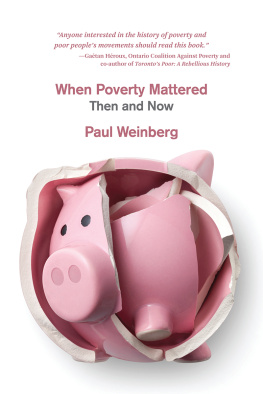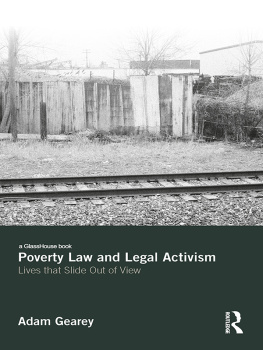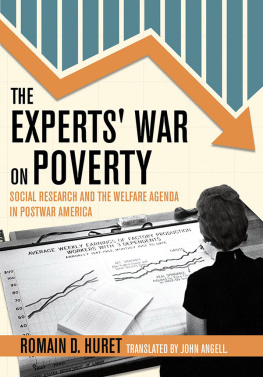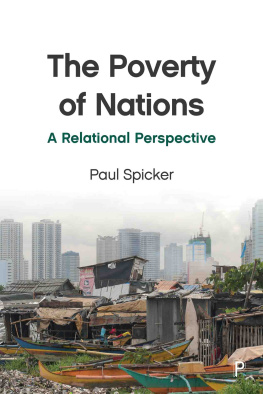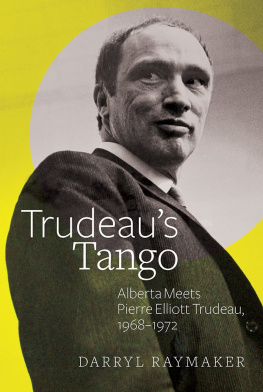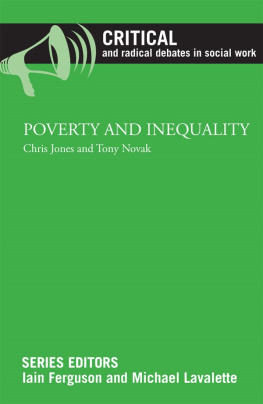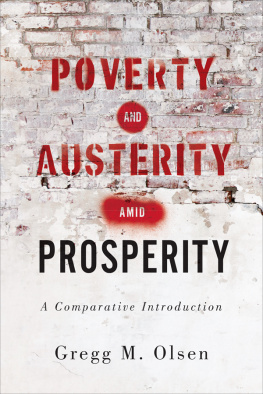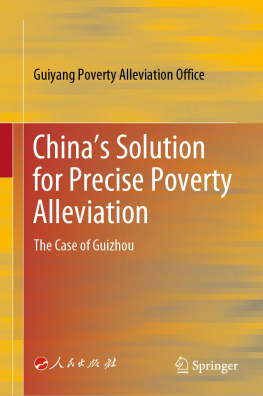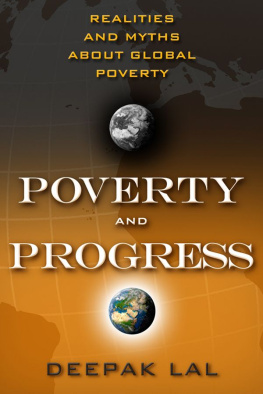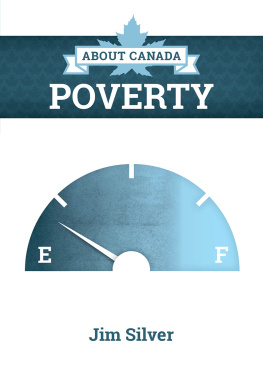When Poverty Mattered
When Poverty Mattered
Then and Now
Paul Weinberg
Fernwood Publishing
Halifax & Winnipeg
Copyright 2019 Paul Weinberg
All rights reserved. No part of this book may be reproduced or transmitted in any form by any means without permission in writing from the publisher, except by a reviewer, who may quote brief passages in a review.
Editing: Brenda Conroy
Cover design: John van der Woude
eBook: tikaebooks.com
Printed and bound in Canada
Published by Fernwood Publishing
32 Oceanvista Lane, Black Point, Nova Scotia, B0J 1B0
and 748 Broadway Avenue, Winnipeg, Manitoba, R3G 0X3
www.fernwoodpublishing.ca
Fernwood Publishing Company Limited gratefully acknowledges the financial support of the Government of Canada, the Canada Council for the Arts, the Manitoba Department of Culture, Heritage and Tourism under the Manitoba Publishers Marketing Assistance Program and the Province of Manitoba, through the Book Publishing Tax Credit, for our publishing program. We are pleased to work in partnership with the Province of Nova Scotia to develop and promote our creative industries for the benefit of all Nova Scotians.

Library and Archives Canada Cataloguing in Publication
Title: When poverty mattered : then and now / Paul Weinberg.
Names: Weinberg, Paul, 1960- author.
Description: Includes bibliographical references and index.
Identifiers: Canadiana (print) 20190137312 | Canadiana (ebook) 20190137401 | ISBN 9781773631806
(softcover) | ISBN 9781773631813 (EPUB) | ISBN 9781773631820 (Kindle)
Subjects: LCSH: PovertyCanada. | LCSH: Public welfareCanada. | LCSH: Economic assistance,
DomesticCanada. | LCSH: PoorServices forCanada. | LCSH: PovertyPolitical aspectsCanada. |
LCSH: EqualityCanada.
Classification: LCC HC120.P6 W45 2019 | DDC 362.50971dc23
Contents
Acknowledgements
When Poverty Mattered: Then and Now represents an expansion of a 2,500-word article that I wrote for the Monitor (Canadian Centre for Policy Alternatives) in March 2015. Here, I explored the rcmp surveillance of a short- lived anti-poverty research institute that was active in the late sixties and early seventies. The headline read as follows: The Praxis Affair: Theres a reason we put limits on spying within Canada. Seeing some parallels today, I decided to take my Praxis story into a broader context after speaking to historian David Tough, who has studied and written about how poverty figured prominently under Prime Ministers Lester Pearson and Pierre Trudeau almost fifty years ago.
Making this book possible is my publisher Fernwood founder Errol Sharpe, Brenda Conroy, my copy editor, and Beverley Rach, managing editor. My appreciation also goes out to the staff at the Toronto Reference Library, Hamilton Public Library, McMaster University Mills Library, Queens University Library and Library Archives Canada. Plus, this project would not have been possible without financial assistance from Ontario Arts Council and the Canada Council and the encouragement from my partner, Cathy McPherson.
Preface
An officer conducting, in his words, discreet surveillance for the rcmp s Security and Intelligence Branch ( sib ) in the fall of 1969 was standing in front of a semi-detached house on leafy Huron Street, just north of the University of Toronto campus. We dont know if the students walking on their way to class took any notice of this person jotting down notes. Days earlier, the local newspaper had reported that the Just Society Movement, a high-profile poor peoples group, was moving to this address to take up space with other activist organizations. The same sib officer wrote the following about the other attached house: Several U/M [unidentified males] wearing beards etc. were observed entering #371 and it would seem it is a rooming house for university types of the hippie caliber ( rcmp sib 1969a ). But the main interest lay with the primary tenant at 373 Huron, the Praxis Corporation Research Institute for Social Change, which was leasing the house from the University of Toronto, the owner of many houses on the street. The same or a different investigator (it is not clear) recorded the following observation a month later: It is increasingly evident that organizations of this nature and stature are deserving of our attention. Failure to do will leave us sadly lacking in being able to comment upon the impetus behind social unrest at the grassroots level ( rcmp sib 1969b .)
So rather inauspiciously begins the forgotten story of Praxis, an independent research institute focused on social issues, community organizing and education. The story is dealt with briefly in historical accounts of the rcmp Security Service in the early 1970s but never fully explored. Suffice it to say that unidentified members of the Security and Intelligence Branch , or the rcmp Security Service as it was known starting in 1970, were already monitoring Praxiss activities in the fall of 1969, as shown by these reports. University professors Stephen Clarkson and Abraham Rotstein, who founded Praxis in late 1968, had ambitious plans for their new organization, but they probably never anticipated this kind of attention, when poverty was high on the political agenda. The close working relationship between Praxis and poor peoples groups, of which there were many in Canada in this period, led to a three-year investigation, surveillance and ultimately undermining of the activities of the research institute.
An estimated 800,000 Canadians in social movements, from womens rights and Indigenous groups to peace organizations, were similarly watched closely in the late sixties and seventies by rcmp security and intelligence services, which appear to have had difficulty distinguishing between legitimate dissent and what was perceived at the time to be subversion. Considering that files were kept on a host of other high-profile Canadians at the time, including Northrop Frye, Farley Mowat, Adrienne Clarkson and Tommy Douglas, this small research institute was in good company.
This book explores the intersection of two issues: the failure to tackle and reduce poverty in the 1960s and what happens when our security and intelligence services are allowed to spy on citizens who are attempting to tackle important issues. The decades of dismantling Canadas social safety net, which started in the 1970s and reached its crescendo in the mid-1990s, have been well documented. In this book I explore the less studied conversation about how poverty mattered between the mid-1960s and early 1970s and the manner in which the rcmp Security Service and its predecessor went after anti-poverty groups such as Praxis and played a part in putting this one organization out of business.
I start with an introduction to the radical politics of the sixties and the response of the government, followed by the rediscovery of the issue of poverty in Canada and the ebb and flow of policy under Prime Ministers Pearson and Trudeau. The bigger picture is viewed through the experiences of three organizations. To sum up, poverty went through various stages in Canada between 1965 and 1971: it started off as a surprising manifestation, and then became a national disgrace, followed by turning into an inconvenience and then a national security concern, before finally being put on the political shelf to gather dust.
At the centre of the book is the Praxis Corporation, an ambitious organization that sought to tackle the biggest issues of its time: poverty and democracy. Its close affiliation with the anti-poverty movement made it a target for the rcmp Security Service, which culminated in the so-called dirty tricks affair and the murky involvement of the extreme right organization, the Edmund Burke Society which has parallels in our time in the twenty-first century. The Just Society Movement started around the same time as Praxis under the leadership of feminist Doris Power. I look at the inner workings of one of most fascinating activist groups of the sixties in Canada. The book also examines the Hamilton Welfare Rights Organization, which was led by a dynamic young musician, Johnny Morris. He encountered considerable hostility from local Hamilton authorities and politicians in his efforts to address the failings in the welfare system.

